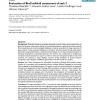971 search results - page 156 / 195 » Automatic prediction of frustration |
SIGIR
2008
ACM
13 years 9 months ago
2008
ACM
We present HAMLET, a suite of principles, scoring models and algorithms to automatically propagate metadata along edges in a document neighborhood. As a showcase scenario we consi...
TIFS
2008
13 years 9 months ago
2008
Poor quality images can significantly affect the accuracy of iris-recognition systems because they do not have enough feature information. However, existing quality measures have f...
BMCBI
2005
13 years 9 months ago
2005
Background: Molecular Biology accumulated substantial amounts of data concerning functions of genes and proteins. Information relating to functional descriptions is generally extr...
JSS
2007
13 years 9 months ago
2007
This paper describes an approach for generating customized benchmark suites from a software architecture description following a Model Driven Architecture (MDA) approach. The benc...
UMUAI
2008
13 years 9 months ago
2008
Abstract. Self-efficacy is an individual's belief about her ability to perform well in a given situation. Because selfefficacious students are effective learners, endowing int...

